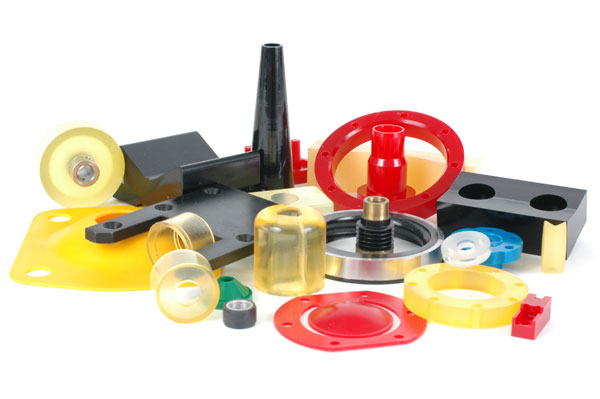Your Questions Answered: Custom Urethane Products FAQ
When it comes to custom urethane parts and products, the possibilities are nearly endless. With the ability to tailor physical properties to meet specific needs, urethane opens up a world of potential for countless applications. But we get it — with so many options to choose from, it’s natural to have questions. That’s why we’re here to help.
Our team at PSI Urethanes has compiled a list of frequently asked questions to guide you through the process. Whether you’re figuring out the right materials or narrowing down specifications, these expert answers are designed to make things clearer and more manageable to create products that perfectly fit your unique requirements.

Frequently Asked Questions
Durometer is the hardness of a non-metallic product or the gauge used to measure the hardness. The two most common elastomer durometer scales, using slightly different measurement systems, are the ASTM D2240 type A and type D scales. The A scale is for softer urethanes, while the D scale is for harder ones.
Polyester versus Polyether
The two main types of polyurethanes are polyester and polyether. Each offers its own performance properties.
What is Polyester?
A chemical building block that provides good resistance to solvents as well as good mechanical properties in the final elastomer.
What is Polyether?
A chemical building block sometimes used in place of polyester that provides exceptional resilience and hydrolytic (reaction with water) stability.
The isocyanates most commonly utilized in polyurethane formulations are TDI and MDI. TDI stands for toluene di-isocyanate and MDI stands for methylene di-isocyanate. Both TDI and MDI urethanes are used in a variety of fields, each is best suited for specific applications.
What is MDI?
Methylene Di-isocyanate is a base form of urethane resin that needs non-Moca Type curatives.
What is TDI?
Toluene Di-isocyanate; A base form of urethane resin that needs Moca Type curatives.
The main difference between thermoplastic polyurethane and thermoset polyurethane is based on the physical properties of the polyurethanes. Due to their unique properties, each is best suited for specific applications.
What is polyurethane's temperature range?
Urethane, depending on the formula, will remain flexible down to -90°F and can withstand temperatures of up to 250°F, though it may soften before that point and lose load-bearing capacity; urethane can withstand intermittently higher temperatures.
Can you machine polyurethane?
Yes, urethane can be machined. Typically harder polyurethane is recommended if the final product is to be machined. Anything 70 shore A and above is preferred but we have seen urethane machined in softer durometers. This would require special methods.
What polyurethane material would work best for my application?
The following guide can be used to select the material most appropriate for your application.
Guideline Selection of Polyurethane
| Property | Greatest | Least |
| Tensile (tension) Strength | Polyester | Polyether |
| Tear Strength | Polyester | Polyether |
| Compression Set | TDI | MDI |
| Rebound | MDI Polyether | TDI Polyester |
| Low Temperature Properties | MDI Polyether | TDI Polyester |
| High Temperature Properties | TDI | MDI |
| Abrasion Resistance: Sliding Impingement (colliding) | Polyester MDI Polyether | Polyether Polyether |
| Heat Buildup | Polyether | Polyester |
| Hydrolysis (reaction with water) Resistance | MDI Polyether | TDI Polyester |
| Oil Resistance | Polyester | Polyether |
| Heat Aging | Polyester | Polyether |
What are some differences between thermoset urethane and thermoplastic urethane products?
The chart below highlights several differences between thermoset polyurethane and thermoplastic urethane products.
| Property | Thermoset Polyurethane | Thermoplastic Urethane |
| Heat Resistance | Holds up in temperatures of up to 250° without issue | Will soften, deform and degrade at higher temperatures |
| Hardness | Wide range of durometers available in “A” & “D” scale | Very small range in “A” scale only |
| Load Bearing Capacity | Ability to hold a great amount of weight per square inch | Unable to hold a great deal of weight without destroying material |
| Abrasion Resistance | Best for abrasive applications because of its high abrasion resistance and cut resistance | Will abrade and tear in these cases |
Does rubber outperform polyurethane in the cold?
Not necessarily. While rubber remains flexible at lower temperatures, polyurethane provides superior durability, impact resistance, and longer lifespan in many cold environments. Special formulations can also improve polyurethane’s low-temperature performance.
Does rubber outperform polyurethane in the cold?
Yes, we can manufacture custom urethane parts even without an existing mold. We offer in-house mold-making services and can design a custom urethane mold based on your part’s specifications.
As you can see, there is a remarkable range of urethane physical properties to choose from, allowing custom urethane to be used across a wide variety of applications and industries.
For more information on the physical properties of custom urethane, be sure to check out the urethane technical brief or contact PSI today.
Ask Our Experts.
Contact us today to learn how we can meet your project’s requirements.
